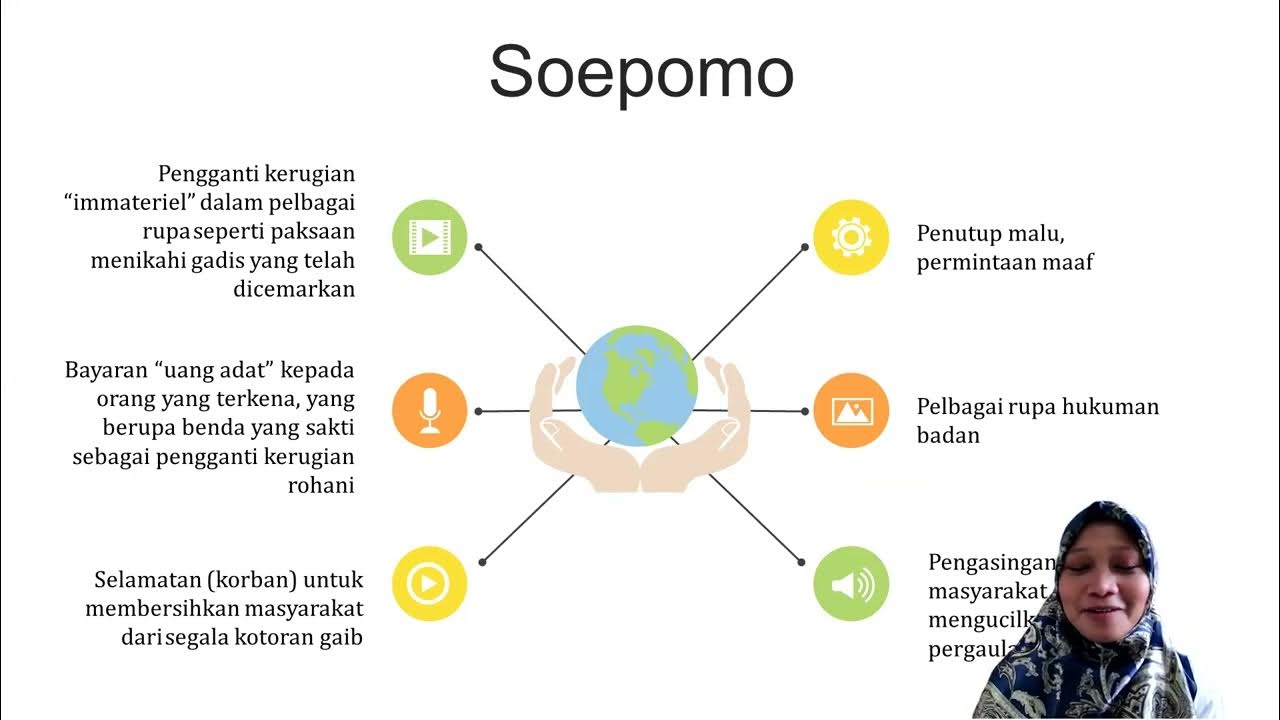13 Oktober 2022
Summary
TLDRThe video discusses the significance of customary law (hukum adat) as a legal system intertwined with the cultural and social fabric of Indonesian society. It contrasts this with Western legal systems, highlighting that customary law emphasizes community relationships and informal dispute resolution, whereas Western systems focus on codified laws and individual rights. The speaker addresses the historical context of Indonesia's legal landscape, shaped by colonial influences, and advocates for a legal framework that harmonizes customary and state laws, aligning more closely with Indonesia's cultural values for effective legal governance.
Takeaways
- 🌳 Traditional law systems, like adat law, function as a cohesive system with interconnected parts, much like a tree or a building.
- 🔍 Adat law is often viewed skeptically as outdated, yet it is a legitimate legal system rooted in the community's cultural perspectives.
- 🌍 Adat law exists not only in Indonesia but in various forms around the world, recognizing the importance of customary practices.
- 📜 The Western legal system, particularly continental and common law, has influenced many post-colonial countries, including Indonesia.
- ⚖️ Continental law emphasizes written laws and formal procedures, while common law allows for more flexibility and consideration of customs.
- 🤝 Adat law seeks to restore harmony through community-based resolutions, contrasting with the punitive focus of Western legal systems.
- 🔗 The integration of multiple legal systems in Indonesia—adat, Islamic, and continental law—creates complexity and sometimes conflicts in legal practices.
- 🏛️ The legal status of written law differs between systems; in continental law, unwritten rules are often disregarded, while in adat law, customary practices hold significant weight.
- 💬 Adat law promotes communal decision-making and responsibility, unlike Western law, which often separates public and private matters.
- 🔄 A potential evolution in Indonesia's legal system could align adat law principles with national legislation to better reflect the values of its society.
Q & A
What is customary law (hukum adat) in Indonesia?
-Customary law is a legal system that emerges from the norms and values of a society, existing independently of written laws and formal regulations.
How does customary law differ from Western legal systems?
-Customary law focuses on societal practices and communal values, while Western legal systems, such as continental and English law, emphasize formal written statutes and legal certainty.
What are the characteristics of continental law?
-Continental law prioritizes legal certainty, adhering strictly to written laws and established codes, often lacking flexibility in interpretation.
How does English law treat customary practices?
-English law recognizes customary practices and allows judges greater discretion in interpreting laws, making it more adaptable than continental law.
What challenges does Indonesia face in integrating customary law with formal law?
-Indonesia's legal system, influenced by its colonial past, often reflects Western legal principles, which can create a disconnect between societal practices and formal law.
What role do cultural values play in customary law?
-Cultural values are central to customary law, as it aligns with community practices and promotes restorative justice, contrasting with punitive measures often seen in Western systems.
Why is it important for Indonesia to evolve its legal system?
-Evolving the legal system is important for Indonesia to better reflect its cultural identity and societal values, aiming for a more effective and harmonious legal framework.
How does customary law promote restorative justice?
-Customary law encourages resolution methods that focus on repairing harm and restoring relationships within the community, rather than solely punishing offenders.
What implications do the differences between customary and Western law have on dispute resolution?
-The differences can lead to varying approaches in resolving disputes, with customary law favoring community-based solutions, while Western law often relies on formal legal proceedings.
How can understanding these legal systems benefit Indonesian society?
-Understanding both customary and Western legal systems can enhance legal literacy and promote better integration of culturally relevant practices into the formal legal framework.
Outlines

Cette section est réservée aux utilisateurs payants. Améliorez votre compte pour accéder à cette section.
Améliorer maintenantMindmap

Cette section est réservée aux utilisateurs payants. Améliorez votre compte pour accéder à cette section.
Améliorer maintenantKeywords

Cette section est réservée aux utilisateurs payants. Améliorez votre compte pour accéder à cette section.
Améliorer maintenantHighlights

Cette section est réservée aux utilisateurs payants. Améliorez votre compte pour accéder à cette section.
Améliorer maintenantTranscripts

Cette section est réservée aux utilisateurs payants. Améliorez votre compte pour accéder à cette section.
Améliorer maintenant5.0 / 5 (0 votes)






